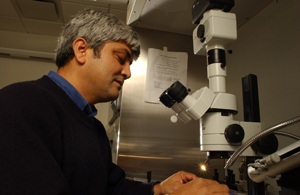A UNMC research team led by Iqbal Ahmad, Ph.D., professor of ophthalmology and visual sciences, has “reprogrammed” regular body cells to resemble embryonic stem cells without the use of potentially harmful foreign genetic material.
 |
Iqbal Ahmad, Ph.D., led a UNMC research team that has found a way to make normal cells act as stem cells by altering the environment in which the normal cells are cultured. This would allow scientists to create the stem cells without introducing foreign genetic material into the normal cells, which leads to immunity issues. |
The research is the first proof in principle that somatic, or body cells, can be transformed into induced pluripotent stem cells (iPSCs) simply through the influence of the microenvironment in which the sampled cells are cultured. Previously, genetic materials were introduced into somatic cells to reprogram them to become stem cells.
“Our findings provide evidence for an emerging view that somatic cells may be reprogrammed safely and simply by defined chemicals and other factors, which may facilitate their clinical use,” Dr. Ahmad said. “The next step is to know how robust the reprogramming is and what existed within the microenvironment to cause it.”
Dr. Ahmad said his findings wouldn’t have been possible without embryonic stem cell research.
|
 |
Sudha Balasubramanian, Ph.D., a former post doc in Dr. Ahmad’s laboratory, did work that was essential to the team’s findings. |
This technique may allow ‘autologous cell transplantation,’ where the donor of the cells also is the recipient. This is preferable to using cells from another person, which may cause the patient’s immune system to reject the transplanted cells.
The efforts of Sudha Balasubramanian, Ph.D., a former post doc in his laboratory, were essential to this team’s findings, Dr. Ahmad said.
“She absolutely carried this project on her shoulders and this work couldn’t have happened without her,” Dr. Ahmad said.